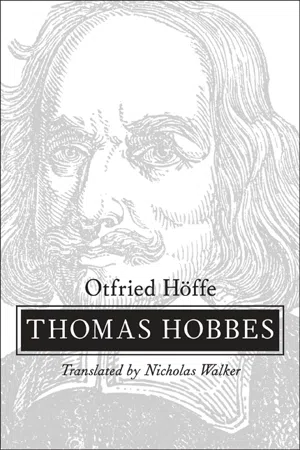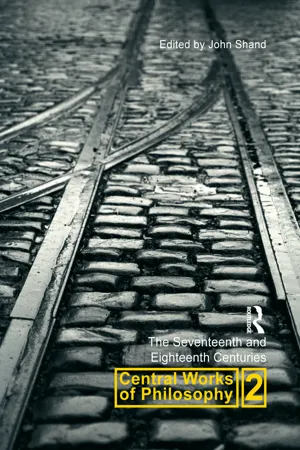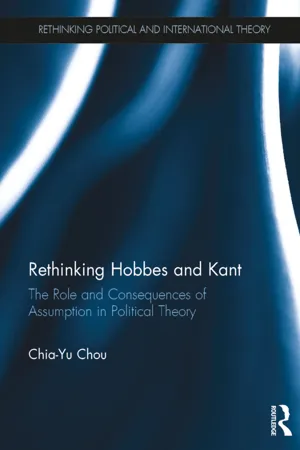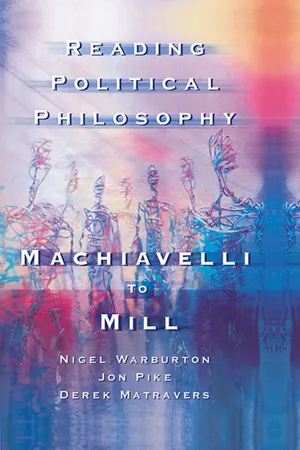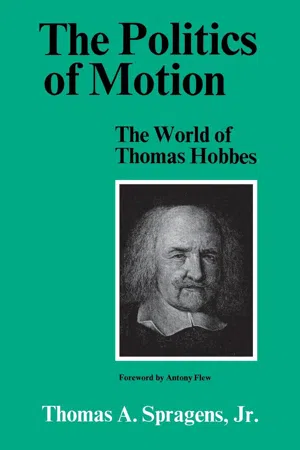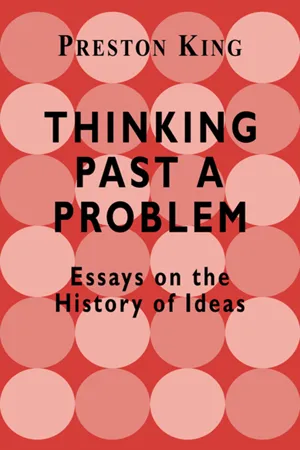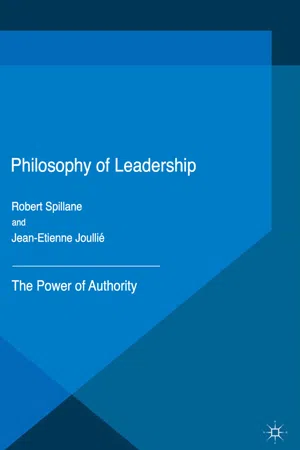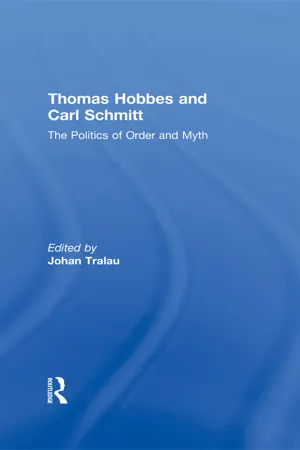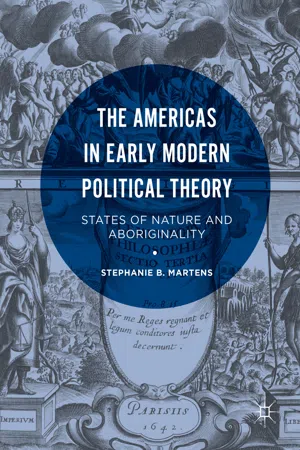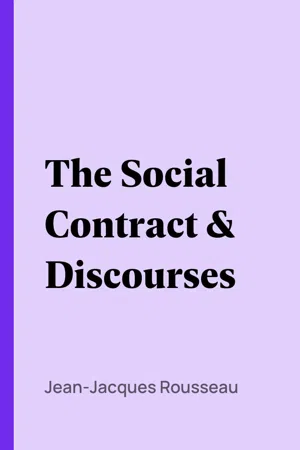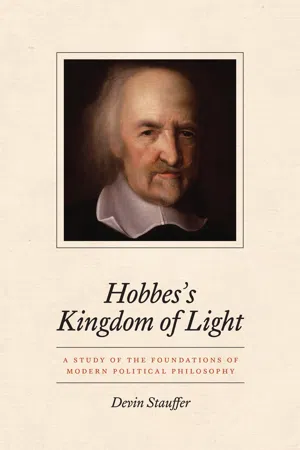Politics & International Relations
Thomas Hobbes
Thomas Hobbes was a 17th-century English philosopher known for his work on political theory. He is best known for his book "Leviathan," in which he argued for the necessity of a strong central authority to maintain social order and prevent the "war of all against all" that he believed would occur in a state of nature. Hobbes's ideas have had a significant impact on political thought and the development of modern political systems.
Written by Perlego with AI-assistance
Related key terms
11 Key excerpts on "Thomas Hobbes"
- eBook - ePub
- Otfried Höffe, Nicholas Walker(Authors)
- 2015(Publication Date)
- SUNY Press(Publisher)
ONE Introduction Thomas Hobbes: A Pioneer of ModernityI f the philosophy of the state, and of the nature of political authority as such, had long been a neglected, even expressly despised, area of study, there is certainly no doubt about its acute contemporary relevance. In view of an ongoing wave of wars, and particularly of civil wars and internal social conflicts, we no longer simply talk of “prosperity” or “emancipation” as the ultimate ends of political action and intervention. These ends now seem more basic and elementary, namely: peace and freedom, in immediate conjunction with the principle of justice.The quest for a social order capable of securing such ends has now lost any suggestion of musty irrelevance. The fundamental question for any philosophy of politics—the legitimation and limitation of the public exercise of power—has emphatically passed beyond a merely antiquarian interest in intellectual history and has returned to occupy the place where it has always belonged: the center of a truly political philosophy. And Thomas Hobbes is one of the most important representatives of political philosophy in this sense.Yet this thinker was concerned with far more than simply “the state” and the nature of law and political authority. For the body of work that Hobbes left us is essentially encyclopedic in character. This philosophy embraces an ontology and a natural philosophy; it examines the nature of language, reason, and knowledge; it investigates human feelings and emotions, and many other issues in what we would now call the philosophy of mind; and, last but not least, it engages with fundamental questions of morality and religion.If we ignore the field of mathematics, where Hobbes occasionally lost his way (for a judicious account of his views in this respect, see Grant 1996), he addressed his chosen problems in a way that is almost always original, and indeed radical in two senses of the word. In his thorough and resolute pursuit of understanding he penetrates below the apparent surface, illuminates hidden corners of experience, and thereby opens up new perspectives that are highly challenging in both substantive and methodological terms. Hobbes is an intellectual revolutionary who undertook nothing less than a fundamental re-grounding of philosophy, one comparable in its radicality with the new beginning proposed by Descartes. But apart from the methodological significance that he assigns to mathematics—something that he shares with the French thinker—Hobbes develops an entirely different revolution in the field of philosophy. He regards the famous Cartesian argument from the cogito as fallacious, he repudiates all mind-body dualism, and he replaces ideas with nomina - eBook - ePub
Central Works of Philosophy v2
Seventeenth and Eighteenth Centuries
- John Shand(Author)
- 2015(Publication Date)
- Routledge(Publisher)
Leviathan G. A. J. RogersDOI: 10.4324/9781315712253-4Introduction
Hobbes's most important philosophical work in English was undoubtedly Leviathan, which was published right in the middle of the seventeenth century, in 1651. It is too often regarded as a work of political philosophy only, when any serious attention to its texts shows it to be much more than that, containing as it does elements drawn from Hobbes's wider account of human beings and the world, which is his whole philosophical system. In that sense it can be argued that Leviathan is part of a complete philosophy, which stands in marked contrast with the then still most influential philosophy in Europe, that of the ancient Greek Aristotle. In the thirteenth century Thomas Aquinas had combined Aristotle's philosophy with Christian theology into a synthesis that came to dominate the universities, then just being created across Europe, for the next four hundred years. It was Hobbes's objective to supply an alternative and superior system to that of Aristotle and his Christian followers that would combine an atomistic materialism with an account of knowledge and society that would identify an intelligible and practical system of government where peace and prosperity would flourish. The name "Leviathan" derives from the Bible. It is described as a large and powerful sea creature, impossible to defeat, with whom it is not even possible to enter a contract (see especially Job 42). In its fearful aspect it perhaps detracts from Hobbes's intention to reveal the state - "that mortal God" - which Leviathan represents, as a necessary force for human good, second only in power and importance for humanity to God himself.That Hobbes chose a biblical source for the image and title of his magnum opus is significant. The place of religion within his philosophy is central. To give some indication of that we might note that the Bible is cited over seven hundred times in the text and more than half the book is devoted to discussing politics and religion. Nor should this surprise us. Hobbes was quite sure that religious belief was very much part of human nature and differences in religious views were perhaps the single greatest cause of civil and international conflict. When he wrote Leviathan, - eBook - ePub
- Chia-Yu Chou(Author)
- 2016(Publication Date)
- Routledge(Publisher)
Rather, as Eisenach indicates, historically, it is advantageous to take seriously Hobbes’ account of supernatural history in Leviathan because it permits us to see more clearly the place of Leviathan in the context of the political [and religious] crises’ of his time (ibid.: 15). Intellectually it allows us to further explain some paradoxes or difficulties in Hobbes’ rational construction of the commonwealth, not least in his account of international relations. 16 The original term Kant uses is ‘the rights of nations’, but Kant indicates explicitly that this term ‘in German’ ‘should instead be called the right of states’ (Kant, 1996: 114). 17 For the political role of war in Kant’s peace plan, see Mara, 2013; Williams, 2012: ch. 1; for the debate on the relationship between Kant’s view and just war tradition, see Williams, 2012; Orend, 2000. 18 For more discussion on these conflicting views, see Cavallar, 1999, esp. chs 6 and 7. 19 It is clear that Cavallar has this presumed opposition in mind, so, while he notes that ‘Kant is completely Hobbesian in his analysis of the status quo’, he goes on to say that in contrast to Hobbes, ‘Kant postulates a juridical duty to leave this state of nature in the sphere of international relations as well’ (1999: 55). As has been demonstrated, Hobbes also views leaving the lawless condition as a moral command. While the juridical status of Hobbes’ claim might be ambiguous to some, the substance of his claims coincides with Kant’s. 20 There are three Definitive Articles. First, ‘The Civil constitution of Every State Shall be Republican’. Second, ‘The Right of Nations shall be based on a Federation of Free States’. Third, ‘Cosmopolitan Right shall be limited to Conditions of Universal Hospitality’ (Kant, 1991: 98–108) - eBook - ePub
Reading Political Philosophy
Machiavelli to Mill
- Derek Matravers, Jonathan Pike, Nigel Warburton(Authors)
- 2014(Publication Date)
- Routledge(Publisher)
In political philosophy, one of the key disagreements is over which of the properties of human nature are essential and which are accidental and so potentially specific to a space and time. Hobbes wanted to show that self-interested behaviour is essential: marxists and anarchists want to insist that such behaviour is ‘accidental’ and therefore potentially eliminable.in foro externoLiterally ‘in the external forum’. Essentially, here, Hobbes refers to activities, specifically the execution of the laws of nature. The laws of nature do not always oblige absolutely in this area.in foro infernoLiterally ‘in the internal forum’. Essentially, here, Hobbes refers to the mind of a moral agent – an area the laws of nature oblige absolutely.patriarchyLiterally ‘rule by fathers’. However, it is important to distinguish between modern and classical uses of the term. Classical patriarchalism, such as is found in Sir Robert Filmer’s Patriarcha (1680), is the view that political authority has its roots in the subjection of sons to their fathers. Political authority, therefore, is natural, and does not rely on contract or consent.sovereignHobbes’s sovereign is the person who bears the part of the purely artificial person of the state. The sovereign may be a single individual, in the case of a monarchy, or a collection of individuals, in the case of aristocracy or democracy. Hobbes’s preference was for monarchy.Further reading
- Gauthier, David P. (1969) The Logic of Leviathan (Oxford University Press). This is the standard account of Hobbes interpreted in terms of game theory.
- Hampton, Jean (1986) Hobbes and the Social Contract Tradition (Cambridge University Press). A more recent account of a game-theoretic approach to Hobbes, expanding on the criticism that his alienation argument reduces to an agency one.
- Macpherson, C.B. (1962) The Political Theory of Possessive Individualism (Oxford University Press). A contentious but stimulating account of Hobbes, Locke and the Levellers, influenced by a marxist perspective.
- Pateman, Carole (1988) The Sexual Contract
- eBook - ePub
The Politics of Motion
The World of Thomas Hobbes
- Thomas A. SpragensJr.(Author)
- 2021(Publication Date)
- The University Press of Kentucky(Publisher)
The source of coherence in society must be a single voice which is empowered to lay down the basic political definitions of the society—the common framework of meanings to which each individual citizen must subscribe. This single voice was, of course, that of the sovereign, who based his sovereignty upon his fundamental role as a Great Definer. As Wolin puts it, ‘the Hobbesian sovereign occupied a truly awesome position. He was the unchallengeable master of the system of rules or stipulative definitions fundamental to political peace.’ 51 Another interpretation argues that the central structuring element of Hobbes’s political theory is sociological rather than philosophical. In his study of Hobbes, C. B. MacPherson offers a perceptive example of this approach as one variant of the political theory of ‘possessive individualism.’ 52 Like Rousseau, MacPherson contends that Hobbes’s construct of the state of nature does not actually represent a genuinely presocial order, but instead retains traits which are products of social conditioning. 53 Specifically, Hobbes’s model of the state of nature, like all his models, is permeated by features of a competitive market society. It is the incorporation of this form of social order into his assumptions that provides one of the essential foundations of Hobbes’s psychology, MacPherson contends: ‘his postulate that the power of every man in society is opposed to the power of every other man requires the assumption of a model of society which permits and requires the continual invasion of every man by every other.’ 54 Furthermore, the model of a competitive market society serves not only as the link between Hobbes’s physiological postulates and his psychological doctrines but also as the basis of his theory of political obligation: ‘The real basis of Hobbes’s political obligation is. . - eBook - ePub
Thinking Past a Problem
Essays on the History of Ideas
- Professor Preston King, Preston King(Authors)
- 2013(Publication Date)
- Routledge(Publisher)
Reason is a form of regulated thought available to humans. Reason is a form of language, and is not altogether independent of it. It is the instrument by which humans understand, and thus combine, one with another. Language has no preordained meaning or purpose but that which individuals individually give it. Hence the importance of human nature, of human will and of social contract. A society for Hobbes is a form of verbal order. It expresses a convergence of wills. Individuals are not just social creatures, but self-interested solipsists, who enter into society as part of an express or tacit desire for personal good and gain. Individuals accordingly do not exist for society, but society for individuals. For Hobbes, however, the ultimate achievement of human rationality is a firm recognition of the limits of rationality, and consequently of the need for authority. Rationality, for Hobbes, leads to the conclusion that order, which he assumes all humans to desire, can only be purchased at the cost of submission to some external authority. Here again there is much room for dispute as to how consistently authoritarian Hobbes’s conclusion actually proves.Hobbes’s overall philosophy provides both an explanation and a justification for the emergence of the state, and for the consolidation and concentration of state power. It is in part because he does this so powerfully and coherently, and in the apparently neutral, scientific language of modernity, that Hobbes is rightly taken to be so great a figure. He establishes from the outset a continuity between natural and social science. He lights upon the biological and decisional autonomy of the individual. He insists upon individual difference, in the form of divergent perceptions and interests, even while insisting upon equality of human condition. It is indeed this very equality which for Hobbes supplies the ground for a legitimate and rational mutual fear. For Hobbes, it is this fear which contradicts prospects of social peace and simultaneously foreshadows the logic of its accomplishment.Since there is no natural accord, and everyone cannot be sovereign, the security to which reason and speech point is submission to some individual (or group) among them. Thus does Hobbes take up from Bodin the logic of the idea of sovereignty – the logic of establishing an ultimate and all-powerful arbiter who cannot effectively be argued against. But again there are interpretive difficulties: what are the limits that Hobbes may or may not have intended to apply to sovereign authority? If the individual’s own interest – self-preservation – is paramount, then how can this interest be meaningfully protected without legal constraints of any kind upon the sovereign? There is the inevitable problem about empowering a Leviathan - eBook - ePub
Philosophy of Leadership
The Power of Authority
- Jean-Etienne Joullié, Robert Spillane(Authors)
- 2015(Publication Date)
- Palgrave Macmillan(Publisher)
Hobbes’ analysis of political leadership is authoritarian rather than totalitarian and his fundamental assumption about human nature is supported by the frequency of human violence generally. What emerges from his philosophy is the recognition that the development of social power depends on accepting the necessity for centralisation, and a willingness to grant authority to those who occupy the social centre. The authoritarian aspect of the Hobbesian picture lies in the right of the sovereign to use coercive power in the interests of social solidarity. Few people would reject the desirability of conceding authority to those who use their power to prevent people from intruding on the rights of their neighbours. Hobbes, however, sets few, if any, limits to the extent to which individuals are subjected to ‘authoritarian’ coercion.At the end of Leviathan , he wrote ironically that there is nothing in the book that is contrary to good manners and no words that should disturb public tranquillity. He recommended that the book be taught in the universities, but his recommendation merely inflamed the passions of the bigots who, accusing him of atheism and other heinous crimes, tried to have him arrested. Leviathan was banned from the universities and copies were publicly burned at Oxford. After the Restoration, which began in 1660, he was accused of being a ‘libertine’ and a danger to the moral fabric of English society. This charge was based on the widespread view that he was an atheistic materialist who believed that all human relationships are based on power. For decades thereafter, the ‘Hobbist’ was represented in the theatres as a Machiavellian rebel and stage villain.Although he is often placed in the same political category as Machiavelli, presumably because both emphasised the fact that power is the central concept in politics, Hobbes was in fact a proto-liberal whose credentials would have been more apparent if he had substituted ‘law’ for ‘sovereign’. Disappointed but not unduly perturbed by his reputation as a villain, this man of courageous wit and passionate scepticism died in 1679. - eBook - ePub
Thomas Hobbes and Carl Schmitt
The Politics of Order and Myth
- Johan Tralau, Johan Tralau(Authors)
- 2013(Publication Date)
- Routledge(Publisher)
Introduction: Thomas Hobbes, Carl Schmitt, and three conceptions of politics Johan TralauStatsvetenskapliga institutionen, Uppsala University, Uppsala, SwedenIn this introduction, the author argues that Thomas Hobbes and Carl Schmitt can help us rediscover the foundations of politics and political thought. In the years since World War II, the prevailing paradigm of politics has largely centred on the redistribution of resources. Hobbes and Schmitt, by contrast, help us appreciate two other conceptions of politics. Firstly, these thinkers averred that it is the problem of order – not redistribution – which is the fundamental concern for any society. Secondly, both were acutely aware of the role played by myth: that is, how shared ideas – sometimes created for this very purpose – serve to promote order, social cohesion, and law-abiding behaviour. The author also argues, finally, that normative theory and the social sciences in general have often neglected these two conceptions of politics.Few people would dispute the fact that Thomas Hobbes belongs to the canon of very important political thinkers. The chaotic state of nature and the social contract constituting political obligation are, among other Hobbesian things, indisputedly part of our political and philosophical heritage – the sort of intellectual luggage we carry around whether we like it or not. Carl Schmitt’s role in that canon of political thought is more of a disputed matter, primarily because of his involvement in National Socialism during the first years of Hitler’s reign. However, as a legal scholar, Schmitt was a star even before 1933, and his fascinating work on sovereignty, on the law of peoples, and on other topics, such as literature, spans decades after 1945. Of course, Schmitt has always been important in Germany, though in some cases only in a negative way, as a counter-example or as the model of what political theory should not be. And in many parts of Europe, such as Italy, Schmitt was very much à la mode - eBook - ePub
The Americas in Early Modern Political Theory
States of Nature and Aboriginality
- Stephanie B. Martens(Author)
- 2016(Publication Date)
- Palgrave Macmillan(Publisher)
12 The relationship between the travel literature on the Americas and the state of nature is one of the important threads in this tapestry: its analysis will contribute to a better understanding of social contract theory as a historically and geographically situated mode of argumentation, of its significance as a political theory, and of its lasting impact on the modern and contemporary conceptions of citizenship and subjectivity. After being deemed “lost in time” and ahistorical, here the Americas find a way into history, through the artifice of the state of nature, but it comes at a great cost for indigenous populations.Choice of Texts and Organization of the Chapter
I have selected two authors and two works of political theory as case studies: Hobbes’s Leviathan and Locke’s Treatises on Government . They were chosen for their historical endurance and lasting influence in political theory, but also because they both provide the reader with a full-fledged state of nature, often depicted in detail and occupying a central role in the texts and theories. In textbooks, Hobbes and Locke are often pitted against one another: the pessimistic Hobbes against the milder Locke. Their states of nature are much contrasted: one where “life of man” is “solitary, poore, nasty, brutish, and short” (chapter 13 of Leviathan ), versus another where life remains livable and even relatively peaceful, although inconvenient. From these contrasting states of nature emerge contrasting views of the civil society and of its legitimate government: absolute sovereignty for Hobbes, limited government for Locke. Despite these major divergences, the analysis will show how the references to the Americas function within both texts in a similar fashion, contributing to the transformation of American-ness - eBook - ePub
- Jean-Jacques Rousseau(Author)
- 2014(Publication Date)
- Perlego(Publisher)
The second theory, in its ordinary form, expresses only the view that the people is everywhere Sovereign, and that, in the phrase of Milton's treatise, "the power of kings and magistrates is only derivative." Before, however, this view had been worked up into a philosophical theory, it had already been used by Hobbes to support precisely opposite principles. Hobbes agrees that the original contract is one between all the individuals composing the State, and that the government is no party to it; but he regards the people as agreeing, not merely to form a State, but to invest a certain person or certain persons with the government of it. He agrees that the people is naturally supreme, but regards it as alienating its Sovereignty by the contract itself, and delegating its power, wholly and for ever, to the government. As soon, therefore, as the State is set up, the government becomes for Hobbes the Sovereign; there is no more question of popular Sovereignty, but only of passive obedience: the people is bound, by the contract, to obey its ruler, no matter whether he governs well or ill. It has alienated all its rights to the Sovereign, who is, therefore, absolute master. Hobbes, living in a time of civil wars, regards the worst government as better than anarchy, and is, therefore, at pains to find arguments in support of any form of absolutism. It is easy to pick holes in this system, and to see into what difficulties a conscientious Hobbist might be led by a revolution. For as soon as the revolutionaries get the upper hand, he will have to sacrifice one of his principles: he will have to side against either the actual or the legitimate Sovereign. It is easy also to see that alienation of liberty, even if possible for an individual, which Rousseau denies, cannot bind his posterity. But, with all its faults, the view of Hobbes is on the whole admirably, if ruthlessly, logical, and to it Rousseau owes a great deal.The special shape given to the second Social Contract theory by Hobbes looks, at first sight, much like a combination, into a single act, of both the contracts. This, however, is not the view he adopts. The theory of a contract between government and people had, as we have seen, been used mainly as a support for popular liberties, a means of assertion against the government. Hobbes, whose whole aim is to make his government Sovereign, can only do this by leaving the government outside the contract: he thus avoids the necessity of submitting it to any obligation whatsoever, and leaves it absolute and irresponsible. He secures, in fact, not merely a State which has unbounded rights against the individual, but a determinate authority with the right to enforce those rights. His theory is not merely Statism (étatisme); it is pure despotism.It is clear that, if such a theory is to be upheld, it can stand only by the view, which Hobbes shares with Grotius, that a man can alienate not merely his own liberty, but also that of his descendants, and that, consequently, a people as a whole can do the same. This is the point at which both Locke and Rousseau attack it. Locke, whose aim is largely to justify the Revolution of 1688, makes government depend, not merely at its institution, but always, on the consent of the governed, and regards all rulers as liable to be displaced if they govern tyrannically. He omits, however, to provide any machinery short of revolution for the expression of popular opinion, and, on the whole, seems to regard the popular consent as something essentially tacit and assumed. He regards the State as existing mainly to protect life and property, and is, in all his assertions of popular rights, so cautious as to reduce them almost to nothing. It is not till we come to Rousseau that the second form of the contract theory is stated in its purest and most logical form. - eBook - ePub
Hobbes's Kingdom of Light
A Study of the Foundations of Modern Political Philosophy
- Devin Stauffer(Author)
- 2018(Publication Date)
- University of Chicago Press(Publisher)
26 But in what way is that? If it is obvious that the political problem of religion was central to Hobbes’s concerns, it is much harder to say how he thought it should be addressed.Let us approach the matter by reviewing the roots and character of the problem as Hobbes saw it. As we have already noted, Hobbes’s entire political teaching depends on the supreme importance of sovereign-enforced peace as the means by which each individual can secure his own preservation. The desire for self-preservation draws men into the commonwealth, or, stated more negatively but more instructively, the fear of violent death makes men flee the state of nature and seek the security that only the commonwealth can provide. The sovereign, moreover, can ensure the obedience of his subjects by freeing them from the fear of violent death at the hands of other men while instilling the fear of punishment by his own sword. Thus, “the passion to be reckoned upon is fear” (Lev. 14.31), for fear supplies the foundation on which Hobbes builds his political structure, the basic goal of which is to replace anarchic fear with orderly or order-producing fear. But this simple solution to the problem of anarchy is threatened by the fact that the fear of other men in the state of nature and the fear of punishment by the sovereign in the civil state are not the only significant kinds of fear. There is also the fear of the power of “spirits invisible.” Even if most men, according to Hobbes, are not often swayed by this fear because invisible spirits are not so manifestly threatening as the visible officers of the sovereign (see Lev. 14.31), that is not true in all cases. At least for some men, “the fear of darkness and ghosts is greater than other fears” (Lev. 29.15). And these men, superstitious though they may be, are not simply crazy. They have a powerful reason for fearing invisible powers more than visible ones, for only the former can threaten men with eternal punishments and entice them with eternal rewards. Precisely because spirits belong—or are believed to belong—not to the visible, temporal realm of bodies, but to a higher, more mysterious realm, they can induce fears and make promises that trump those of the civil sovereign. But the “spirits” in question, in Hobbes’s view at least, do not speak to men directly. The true sources of the problem are the men who claim to represent them and who claim a special authority as the spokesmen of a realm to which other men do not have access. In Hobbes’s view, there is no greater threat to the commonwealth than the influence of these “ghostly authorities.” For they induce men to believe that they should serve two masters, one temporal, the other spiritual, and to fear for their eternal souls more than for their temporal bodies. Where such beliefs and fears prevail, “the commonwealth is destroyed from inside” (De Cive 6.11), because “it is impossible a commonwealth should stand where any other than the sovereign hath the power of giving greater rewards than life, and of inflicting greater punishments than death” (Lev. 38.1).27
Index pages curate the most relevant extracts from our library of academic textbooks. They’ve been created using an in-house natural language model (NLM), each adding context and meaning to key research topics.
